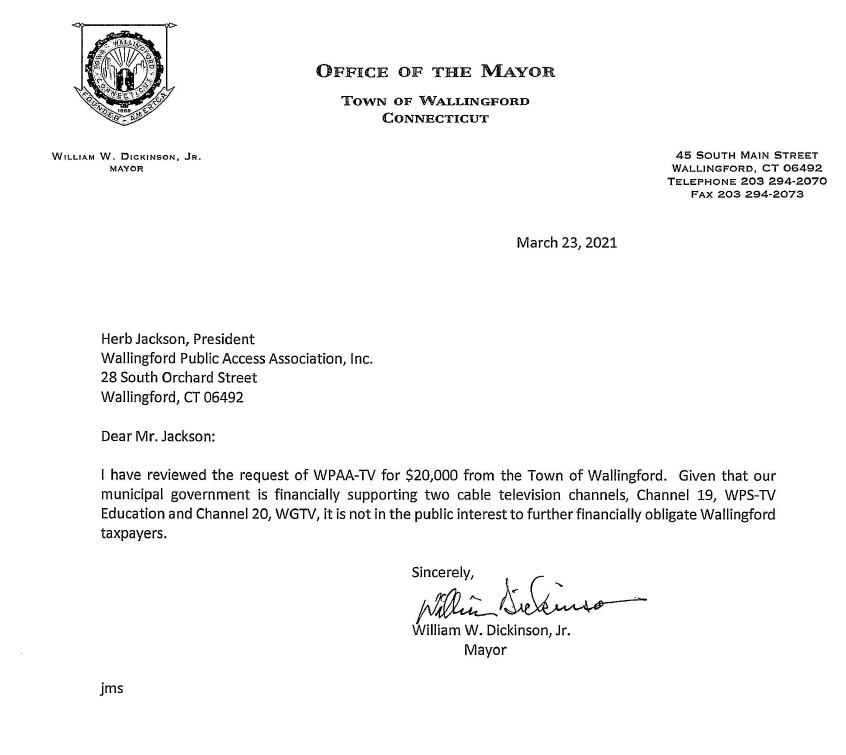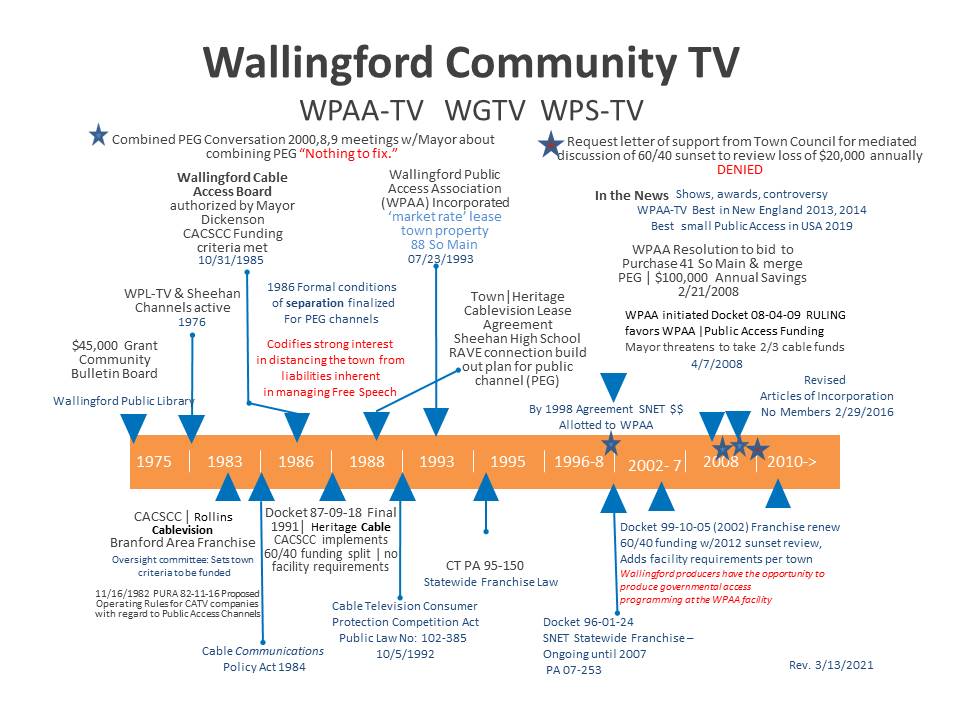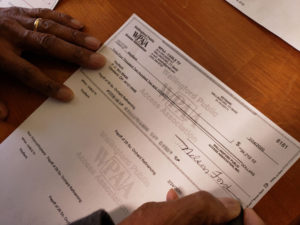Excerpt Citizen Media Maven _ The Life
Real change requires risk and going against the status quo. It comes with discomfort and sometimes confrontation.
It might be a cruel illusion, but I live every day guided by You were put here for a reason the belief that community TV in a suburban community near the city of my maturation is indeed justice work, the work Dr. King intended many of us to have. Since leaving the city that gave bloom to my curiosity, I venture into New Haven whenever possible in the company of my son, poet, playwright and educator, Josiah Houston.
I was a city of New Haven resident on the first Martin Luther King Holiday, a neighbor of John C. Daniels who would become the first black mayor nearly a decade later. In this city divided, economically stagnant and challenged by the crack epidemic, housing shortages, crime, and racial strife, I had become a civic leader and an activist as President of the League of Women Voters of New Haven. It was during this time that, unintentionally, I became acquainted with public access television.
…
For over fifty years, the country as a whole has wrestled with the movement and legacy of Dr. King. I was 14 when King was assassinated. The television in our house was in color unlike when President Kennedy was shot. It began to feel like assassinations of leaders and stories of war in distant places were part of the fabric of America. Robert F. Kennedy had yet to fall. He would attend the funeral of Dr. King.
My dad had finally given up on his idea of a full-fledged civil preparedness bunker, but when the news reported riots he seemed ready to repurpose the cellar bunker for other unknowns. It is hard to imagine what school shootings and heightened security measures for entering schools today make fourteen-year-olds feel Dead students are much more personal than assassinated leaders.
Early television and public access television have eerie similarities in appearance—public access often still looks and feels much the same—however, public access never had a much-trusted voice like broadcast news had Walter Cronkite. Unconsciously, my journey with what my dad called my life’s work began the day Dr. King was shot. I was transfixed as many were with the announcement and updates on the ‘murder’ of this well-respected leader. But, hearing Dr. King mention the First Amendment made history lessons feel astonishingly connected to my life.
CBS Evening News Breaking Report: The ever-trusted Walter Cronkite appears in color in a ‘Just in Live TV’ report. As his eyes dart about for cues from the production crew he adjusts his suit jacket collar. In his well-modulated, unemotional voice he reads the scripted announcement from a paper in his hands:
“Dr. Martin Luther King, the apostle of nonviolence and the civil rights movement, has been shot to death in Memphis, Tennessee,” Cronkite said. “Police have issued an all-points bulletin for a well-dressed, young white man seen running from the scene.” … He reports that in a companion’s words, “The bullet exploded in his face.”
The story facts and carefully selected adjectives speak volumes: the Nobel Peace Prize winner; the turbulent racial situation; on the scene almost immediately; high powered hunting rifle; dusk-to-dawn curfew; 4,000 national guardsmen Will my dad be called-up? They rushed the 39-year-old Negro leader to a hospital where he died of a bullet wound in the neck. Police report that the murder has touched off sporadic acts of violence in a Negro section of the city. Cronkite trips over the word violence That is how he spoke of being mobilized for military action.
After referring to sporadic acts of violence in a Negro section of the city, CBS cuts to President Johnson expressing the nation’s shock “… Saddened by the brutal slaying tonight of Dr. Martin Luther King, I ask every citizen (the president looks down to read more and concludes) to reject the blind violence that has struck Dr. King who lived by nonviolence.”
Returning again to Walter Cronkite reporting on the assassination, the story is crafted to ask and answer the question as to why Dr. King was in Memphis, suggesting King was “determined to prove that he could lead a peaceful mass march in support of striking sanitation workers most of whom are Negroes.” In another cut-away to news footage from the prior day, Dr. King appears mid-speech, “Maybe I could understand the denial of certain basic First Amendment privileges because they haven’t committed themselves to that, over that,” King said. “But somewhere I read of the freedom of assembly. Somewhere I read of the freedom of speech. Somewhere I read of the freedom of press. Somewhere I read that the greatness of America is the right to protest for rights.” The audio track cuts off the crowd’s enthusiastic reply as CBS news producers cut back to Walter Cronkite who echoes the President’s reference with “shock across the nation.” He mentions a place well-known to people like me. A place where black people live: Harlem. Then, the subtle spin. An anonymous quote of a young person in Harlem, “Dr. King didn’t really have to go back to Memphis. Maybe he wanted to prove something.”
It has become routine for WPAA-TV to … The station is closed for the day. We rarely close.
Remembrance seems to make the media world a remix. Dr. King’s face is ubiquitous on the Internet. Quotes and misquotes characterize the man. Facebook is afloat in memes. Politicians, justice workers and pseudo evangelists for people’s rights post some quotes I am not denying that it is hard to eke understanding out of days of reflection and possibly action. Like his initials, MLK celebrations are simplified, peaceful, non-threatening, and most important to the program organizers, they must be digestible I could even say shallow.
As reported in our town’s newspaper, our Mayor is once again the keynote speaker Using the ceremony to parent the community as the benevolent dictator he sees himself as.
Let me share some history here. The state began recognizing Dr. King’s birthday as a holiday in 1973, 10 years before President Reagan signed the Federal law declaring the third Monday in January as the designated holiday. In 2000, a bill submitted by Wallingford’s State Representative to officially recognize the holiday statewide, became Connecticut Law. The only community not already doing so was Wallingford. Paid days off and this holiday was central to a multi-year dispute between the Town and its workers’ union. As Rev. Jesse Jackson said, referring to our Mayor’s resistance to recognizing the King Holiday, ”Maybe he hadn’t gotten the word. But he has got the word now, and the law, and I think he’ll do the right thing.”
The following year, the last of the longstanding inclusive commemorative MLK Day morning services sponsored by the clergy association welcomed a standing room only crowd. The first town-sponsored ‘remembrance’ to honor the civil rights leader with the Mayor presiding was the same day at noon at Town Hall. Wilbert Lawrence “Robby” Robinson, a town resident who founded, and led until his death, the new Wallingford Coalition for Unity was involved in the planning. For the next thirteen years, Robby interacted with the Mayor in supplicant fashion, as he himself described it to me “… it is more important to me that our youth know about Dr. King. I just wanted to make things better and to rid my hometown of its very bad reputation. It is not about me.”
Robby was in the crowd at the March on Washington shoulder to shoulder with believers in nonviolence, experiencing the ether of the ‘I have a Dream’ speech first hand. He was now living as Martin said of that dream “sometimes it is a nightmare” as a black man in Wallingford.
“I think one of the best things that happened to this town—and it’s a sick way of saying it —is Matt Hale (founder of the white separatist group, World Church of the Creator), coming here, or at least his feeling that this was a place he could be … It really got people to open their eyes, to look and think. To think about how members of the KKK could march by our Town Hall.”
In 2015, Robby was honored during the annual MLK commemorative event.  I attended and heard once again, for myself, a deep lack of understanding about the struggles for decency and equality then, and now. The Mayor spoke about Rosa Parks, “Would we have been there? What would we have done? … Had this surfaced today, let it be known that his message is not forgotten.”
I attended and heard once again, for myself, a deep lack of understanding about the struggles for decency and equality then, and now. The Mayor spoke about Rosa Parks, “Would we have been there? What would we have done? … Had this surfaced today, let it be known that his message is not forgotten.”
Mr. Mayor, the message must be heard not to be forgotten. It is not about slaves and stories about the back of the bus. It is about the promise of a decade of open struggle to break the barriers of ‘legal’ segregation to attain citizen rights followed by the ongoing, to this very moment, struggle for equity.
The Mayor is speaking to his choir. Robby, this is not good enough.
In 2020, the Mayor chooses to reflect on the life of orator Frederick Douglass relating Douglass’ courage to Dr. King’s in their respective struggles for abolition and for civil rights roughly 100 years apart. It is reported the Mayor said, “He (King) didn’t grow up a slave, but he recognized what the problem was, and through peaceful living and example brings us to the point to just follow the truth.” Again he entwined his milquetoast world views peppered with slavery stories and avoided the truth of our times. Martin did grow up with a knowing quite different than his own.
Among the commemoration highlights were essay readings by three local high school students. This portion is what had disappointed me most in the past when with camera in hand Which meant a bit of optimism, I did go to the Town Hall ceremony. In our town, authorized events coverage is in the purview of the Mayor and when covered it is to be handled by Government TV, the channel he controls. Since I believe that every story can have many tellers and points of view, as with the day Rev. Jackson came to town, and that exposure to the many stories best informs our ‘knowing,’ I brought a camera along. However, each time the essays were so unremarkable, the video I captured never even made its way to the pending queue for production. I erased it, thereby distancing myself from the experience I do not want to uplift the shallows.
It is Tuesday, shortly after 9:00 PM, and our longest-running WPAA-TV show is airing. Host, Citizen Mike, has actively journeyed in our community media space since 2010. The voice I hear is familiar but it is not the voice of Citizen Mike. The stand-in host, a current Town Councilor says, “I think the Mayor did an excellent job at the Martin Luther King ceremony.” The guest, another Town Councilor, replies, “I agree.” They each call out the strengths of the Mayor with such community gatherings and speeches.
I immediately go in my head to that place that anything about the Mayor makes me go. It is a dark place full of suspicion. I am not a fan. I am someone he wishes never stepped foot into ‘his’ community If only there were a video of the Mayor’s speech which I could play, a video that could inform my sensibilities about my hometown. I am left to wonder ‘what would MLK do?’ recalling the “What Would Jesus Do?” the book which popularizes WWJD bracelets and other paraphernalia meant to be a reminder to act in ways that personified Jesus and his teachings. Would he remind me that “Darkness cannot drive out darkness: only light can do that. Hate cannot drive out hate: only love can do that.” Do I need to reread A Testament of Hope, to stay the course, to avoid the temptation to subvert my own work?
I am certain that unlike these students with search and find quotes and no deep dive into meaning, the Mayor did not need Snopes’ advice on Dr. King’s quote accuracy. Being the technophobe that he is, and likely yet to be a cherry popped Google–Virgin, his Amishness sheltered his access to ‘The 201 best … the 17 inspiring … the 123 most powerful … and the 31 MLK quotes that can inspire the greatness in you! Google’s code of conduct is “Don’t be evil,” but the Mayor believes technology is And without digital literacy, it can be.
While I cannot prove it without video capture of the ceremony, I am near certain the Mayor did not represent Dr. King’s vision of citizenship: voting rights, a living wage, adequate housing, access to health care, and excellent and racially integrated education.
Indeed, the community I serve is proof that we can commemorate Dr. King on the one hand and eviscerate his legacy on the other. Remembrance is not just for storytelling to demonstrate that we have a collective past Collective here, with intent. It is not about slavery or reparations. It is not about the past. It is about being in our own time, with awareness, waging contemporary battles. Dr. King called the American racial revolution, a revolution to ‘get in’ rather than to overthrow. It remains so, in our own time. Dr. King intimated the need not only to see injustices but understand how we all participate in them. Constantly asking himself, Where Do We Go From Here, he answers, “We cannot afford to make these choices poorly … the issue is injustice and immorality.” We can and must consciously do something to change within and around us. Even using this day as a day of service is a digestible cop-out that distracts. If inoculated with a mild form of commitment, thus immune to genuine moral injustice, there can be no transformation.
And then in an Aha moment, …
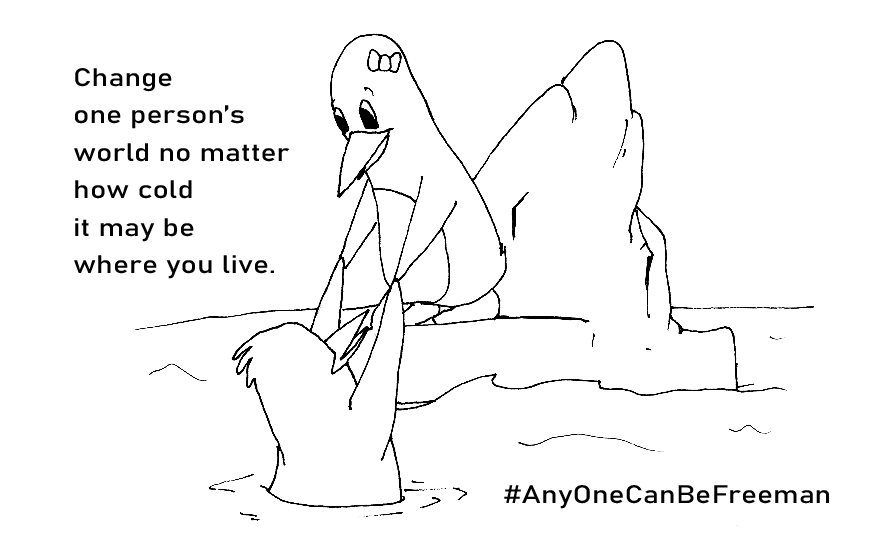
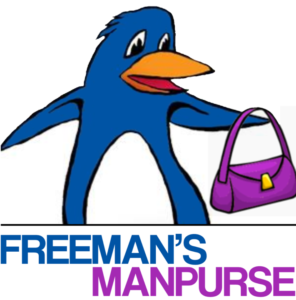 They also asked me to stay on as a full-time volunteer for another three years. This month begins my ninth year. Since my job is not done until our grassroots mission is tied to legions of grassroots supporters, I remain contracted and committed to uplifting Wallingford’s voices and talent for years to come.
They also asked me to stay on as a full-time volunteer for another three years. This month begins my ninth year. Since my job is not done until our grassroots mission is tied to legions of grassroots supporters, I remain contracted and committed to uplifting Wallingford’s voices and talent for years to come.
